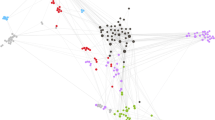Abstract
There is increasing interest in rethinking the history of science according to the geographical locations in which production of scientific knowledge occurs. This movement is identified as a spatial-turn and implies an interdisciplinary dialogue between sociology, geography, anthropology, and historiography of science. Scientometric studies developed as part of this movement we have characterized as “geohistoriometrics”. The present paper is an example of this approach. The aim is to study the emergence of the scientific text and the formation of the author’s profile in America, to provide arguments to support an alternative narrative of the history of science than the Eurocentric. We use the Historical Atlas of Mexican Science, complemented by a critical analysis of text contents, the development of bibliometric networks, geographical locations of the study objects and identification of knowledge flows. For this we use the Pajek-Networking and Quantum Geographical Information System softwares. We found, with a geohistoriometric approach, the improvement of early modern science practices and the integration of authorship with local capacity and independence to produce early knowledge claims as contributions to experimental knowledge. These results are part of a distinct narrative in the history of science in comparison to Eurocentric and Center-Periphery theories.



Similar content being viewed by others
References
200 años del Palacio de Minería: su historia a partir de fuentes documentales. (2013). México, UNAM, p. 712.
Atlas Histórico de la Ciencia Mexicana. (2017). Coordinador Francisco Collazo-Reyes. http://ahcm.bfm.cinvestav.mx/AHCM/. Accessed 10 June 2016.
Bazerman, C. (1988). Reporting the experiment. The changing account of scientific doings in the philosophical transactions of the royal society, 1665–1800. In Shaping written knowledge. The genre and activity of the experimental article in science. United States: The University of Wisconsin Press.
Collazo-Reyes, F., Flores-Vargas, X., Muñoz-García, M. L., & Pérez-Angón, M. L. (2014). Citation practices as semiotic interpretants of certification of local knowledge in astronomy: Mexico 1952–1972. TransInformação, 26(3), 269–279.
Collazo-Reyes, F., Luna-Morales, M. E., Russell, J. M., & Pérez-Angón, M. A. (2011). Emergence and convergence of scientific communication in a developing country: Mexico 1900–1979. In Proceedings of the international society for scientometrics and informetrics (pp. 155–162) Durban, University of Zululand.
Collazo-Reyes, F., Luna-Morales, M. E., Russell, J. M., & Pérez-Angón, M. A. (2017). Emergence of the modern scientific discourse in the American continent: The case of knowledge claims in the discovery of Erythronium/Vanadium in Mexico (1802–1832). Scientometrics, 110(3), 1506–1521.
Collazo-Reyes, F., Luna-Morales, M. E., & Vélez-Cuartas, G. (2010). Surgimiento de las prácticas científicas de colaboración en la ciencia mexicana con cobertura en los índices internacionales. REDES, 19, 1–16.
De Nooy, W., Mrvar, A., & Batagelj, V. (2005). Exploratory social network analysis with Pajek. New York: Cambridge University Press. http://mrvar.fdv.uni-lj.si/pajek/. Accessed 4 June 2016.
Fa-ti, F. (2012). The global turn in the history of science. East Asian Science, Technology and Society: An International Journal, 6(2), 249–258.
Finnegan, D. A. (2008). The spatial turn: Geographical approaches in the history of science. Journal of the History of Biology, 41(2), 369–388.
Frenken, K. (2009). Geography of scientific knowledge: A proximity approach. Eindhoven Centre for Innovation Studies (ECIS), working paper 10.01. http://cms.tm.tue.nl/Ecis/Files/papers/wp2010/wp1001.pdf. Accessed 4 June 2016.
Frenken, K., Hardeman, S., & Hoekman, J. (2009). Spatial scientometrics: Toward a cumulative research program. Journal of Informetrics, 3(3), 222–232.
Galtung, J. (1971). A structural theory of imperialism. Journal of Peace Research, 8(2), 81–117.
Gunn, S. (2001). The spatial turn: Changing history of space and place. In S. Gunn & R. J. Morris (Eds.), Indentitiesin space: Ontested terrains in the Western city science 1850. Aldershot: Asghate.
Horta-Duarte, R. (2013). Between the national and the universal: Natural history networks in Latin America in the nineteenth and twentieth centuries. The History of Science Society. Isis, 104(4), 777–787.
Izquierdo, J. J. (1958). La primera casa de las ciencias en México: el Real Seminario de Minería, 1792–1811. México: Ediciones Ciencia.
Kuhn, T. S. (1971). La Estructura de las Revoluciones Científicas. Mexico: Fondo de Cultura Económica.
Larsen, M. A. (2016). Internationalization of higher education: An analysis through spatial, network, and mobilities theories. United States: Palgrave Macmillan.
Livingstone, D. N. (1995). The spaces of knowledge: Contributions towards a historical. Geography of Science, 13(1), 5–34.
Luna-Morales, M. E., Collazo-Reyes, F., Russell, J. M., & Pérez-Angón, M. A. (2009). Early patterns of scientific production by Mexican researchers in mainstream journals: 1900–1950. Journal of the American Society for Information Science and Technology, 60(7), 1337–1348.
McCook, S. (2013). Focus: Global currents in national histories of science: The “global turn” and the history of science in Latin America. The History of Science Society, Isis, 104(4), 773–776.
Ramírez, S. (1890). Datos para la historia del Colegio de Minería. México: Imprenta del Gobierno Federal. https://archive.org/details/datosparalahist00ramgoog. Accessed 4 June 2016.
Taylor, P., Hoyler, M., & Evans, D. M. (2007). A geohistorical study of the rise of modern science: Careers paths of leading scientist 1500–1900. GAWC Research Bulletin, 233.
Acknowledgements
We acknowledge support from CONACyT (Mexico).
Author information
Authors and Affiliations
Corresponding author
Rights and permissions
About this article
Cite this article
Flores-Vargas, X., Vitar-Sandoval, S.H., Gutiérrez-Maya, J.I. et al. Determinants of the emergence of modern scientific knowledge in mineralogy (Mexico, 1975–1849): a geohistoriometric approach. Scientometrics 115, 1505–1515 (2018). https://doi.org/10.1007/s11192-018-2646-5
Received:
Published:
Issue Date:
DOI: https://doi.org/10.1007/s11192-018-2646-5




